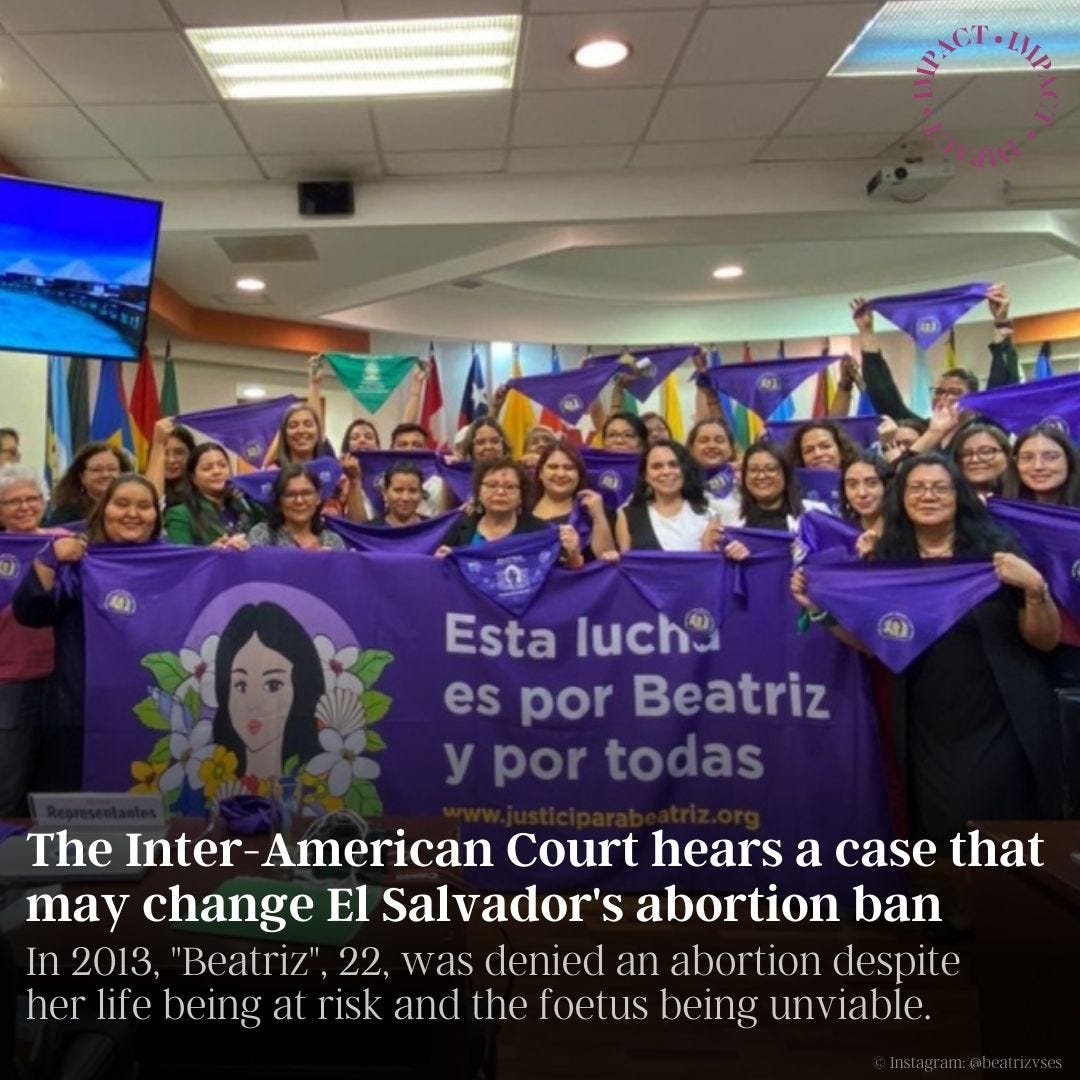The tiny country that offers free contraceptives for all…
and the one that bans abortion in all circumstances
The Wrap brings you all the latest news on women’s rights around the world, including:
- 🇦🇫 Afghan educator jailed by the Taliban
- 💊 Honduras and Peru embrace the morning-after-pill
- 🇵🇱 Polish court finds abortion activist Justyna Wydrzyńska guilty
Read on for more. And if you want to stay up-to-date on feminism worldwide, follow us on Twitter and Instagram.
Parlez-vous français ? Impact is also available in French:
LGBTQIA+ Rights
UGANDA — Uganda’s parliament has passed a bill that criminalises LGBTQIA+ people. With this law, anyone who identifies as a lesbian, gay, bisexual, transgender, queer or “any other sexual or gender identity contrary to the binary categories of male and female” could be imprisoned for up to 10 years or or even face the death penalty. The law expands the government’s persecution of queer and gender-diverse people, after a 2014 anti-gay bill which was struck down the courts. Last year, Sexual Minorities Uganda, an LGBTQIA+ rights organisation, was forced to close. Read our interview with activist Kasha Jacqueline Nabagesera, in which she explains how the new law will affect the LGBTQIA+ community.
Politics and Economics
AFGHANISTAN — Taliban authorities in Kabul have detained the founder of PenPath, an organisation that helps rural children gain access to education in Afghanistan. Matiullah Wesa was arrested as he was leaving a mosque after prayers. Just a day before, PenPath had shared a video of women volunteers demanding the right to an education. The UN has urged the Taliban to provide information about Wesa’s detention. PenPath, founded in 2009, has become a symbol of the struggle against the Taliban’s extreme form of patriarchal rule. Girls in Afghanistan have been barred from attending secondaary classes since September 2021, while women were excluded from university in December 2022. The Zan Library, one of the last spaces for women to read and study freely, was forced to close in mid-March.

Reproductive Rights
LUXEMBOURG — Luxembourg now offers free contraceptives for all. The tiny European country’s national health insurance fund has begun reimbursing the cost of birth control methods such as contraceptive and morning after pills, patches and rings, injections, implants and vasectomies. The new measure was announced by the government following the enactment of a law passed five years ago, which had to be delayed due to the Covid-19 pandemic. The measure does not include condoms, although they are available free of charge in hospitals and other public places.
ANDORRA — Activist Vanessa Mendoza Cortés has denounced the principality of Andorra at the 52nd session of the United Nations Human Rights Council for persecuting her in the courts for speaking out about abortion rights. Abortion is banned in all circumstances in the tiny principality, “forcing women and girls to travel to Spain or France” Cortés told the council. Cortés, the president of the NGO Stop Violències, is accused of committing a crime “against the prestige of institutions” for criticising the government at an earlier session of the UN Committee on the Elimination of Discrimination against Women in 2019. She is on provisional release and faces a fine of up to 30,000 euros.
HONDURAS — Honduras will allow the sale of the morning-after pill again, after it was banned for 14 years. The decision was made by Xiomara Castro — the country’s first woman president — in a decree issued on International Women’s Day. Until now, Honduras was the only country in Latin America with a total ban on the use of emergency contraception. In 2009, a presidential decree outlawed the medication, arguing that it induced abortions. This is false: the morning after pill prevents pregnancy for up to five days after unprotected sex, but is no longer effective once fertilisation has occurred. Honduras is one of the few countries in the world with a total abortion ban.

EL SALVADOR — The Inter-American Court of Human Rights has begun hearing the case of Beatriz et al v. El Salvador. “Beatriz” was a 22-year-old woman who was denied an abortion in 2013. She was diagnosed with systemic lupus erythematosus, an autoimmune disease, and had already gone through one risky pregnancy. Her second pregnancy was life-threatening and not viable; the foetus did not have a cerebral cortex. Beatriz applied to El Salvador’s Constitutional Court for a termination, but the court denied her petition. Abortion is completely banned in El Salvador, even when there is risk to the patient’s life or the pregnancy is not viable, and is punishable by imprisonment. Beatriz was forced to give birth by caesarean and the baby died five hours later. She died in October 2017 in a car accident, so it is her family who has continued her fight. They accuse El Salvador of human rights violations and torture. Human rights activists hope the court’s ruling will require the Salvadoran state to liberalise its abortion laws. The court ruled against El Salvador once before in the case of Manuela, a woman who was imprisoned after suffering a miscarriage and died of cancer shortly after.
POLAND — Justyna Wydrzyńska, the first reproductive rights activist in Poland to be charged with assisting with an abortion, was found guilty in March. She was sentenced to eight months of “restriction of liberty”, and will have to perform 30 monthly hours of unpaid community work, but is appealing the conviction. Wydrzyńska, one of the four founders of Abortion Dream Team, gave abortion medication to a woman who was experiencing domestic violence. Abortion Dream Team does not directly provide abortion medications to people, instead directing them to services outside Poland, but Wydrzyńska said she had made an exception due to the urgency of the case, which took place during lockdown. Although it is not illegal to end a pregnancy in Poland using medication purchased online, to provide someone with that medication is considered a criminal offence. The country bans abortion except in cases of rape, incest or risk to the patient’s life. Abortion in cases of foetal abnormalities was banned in January 2021. Read our interview with Wydrzyńska from 2022.
UNITED STATES — The governor of New Mexico, Michelle Lujan Grisham, has signed a bill that overturns local abortion bans. While the state guarantees access to free abortion, in two counties and three cities the procedure was limited by local restrictions. The Reproductive and Gender-Affirming Health Care Freedom Act signed by Grisham now prohibits local municipalities from restricting abortion rights. It also protects access to gender-affirming care. The New Mexico state legislature also passed a bill that safeguards abortion providers. Meanwhile, Wyoming has become the first state in the country to ban the use of abortion medication. The legislation, signed by Republican Governor Mark Gordon, also restricts access to abortion except in cases of rape, incest or risk to the patient’s life. In Texas, anti-abortion activists are challenging the Food and Drug Administration’s approval of the abortion medication, mifepristone, in court. It’s feared the case could lead to a national ban on the abortion pill.
PERU — The morning after pill will be provided free of charge in Peru, after a constitutional court ruling that orders the Ministry of Health to distribute the emergency oral contraceptive in all health centres nationwide. However, the Peruvian congress has also passed a bill that recognises the “rights of the conceived”. Feminist lawmakers delayed the legislative process by submitting an appeal. In Peru, a person has rights from birth, but the civil code establishes that human life begins at conception. This has historically impeded abortion, except when the patient’s life is at risk. The amendment to article 1 of the civil code — proposed by the right-wing Popular Renewal party — gives a foetus the same legal status as the pregnant patient. It states that “it is up to the mother or spouse, partner or relatives” to decide what to do when the pregnancy is risky. Congress must vote again on the bill within the next 30 days.

